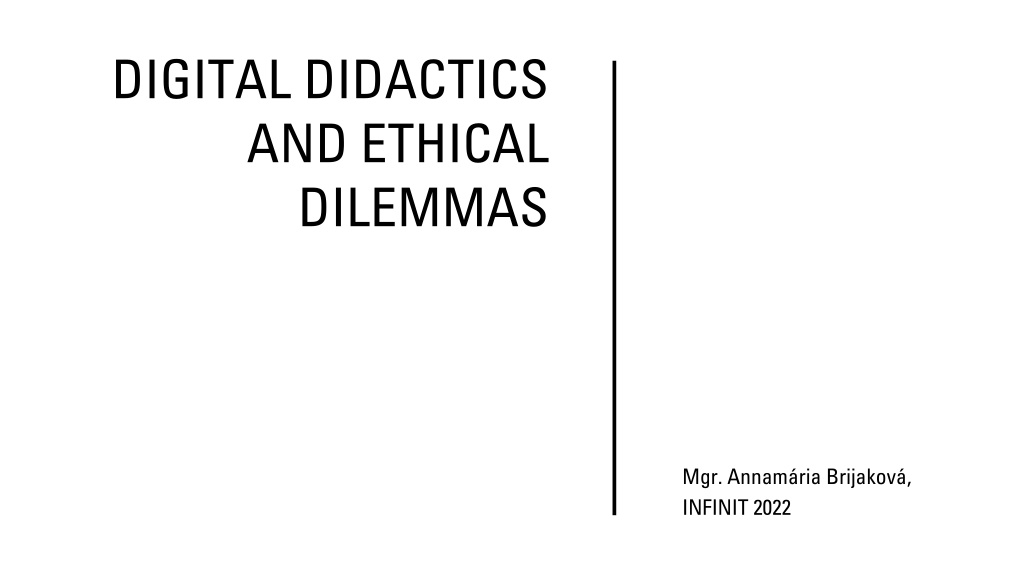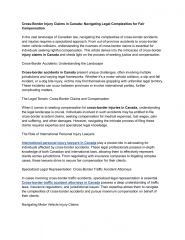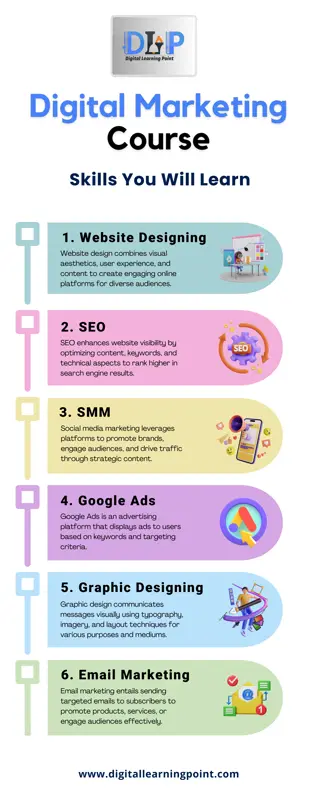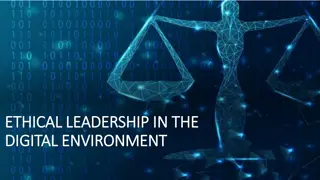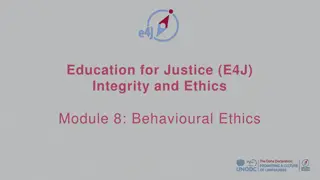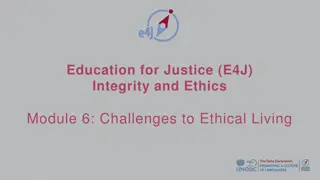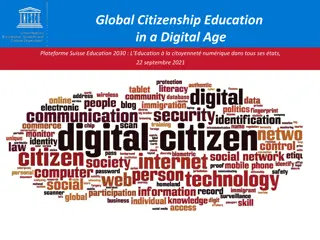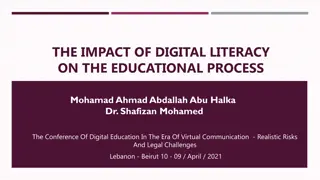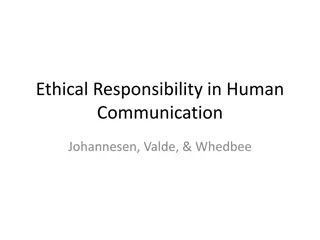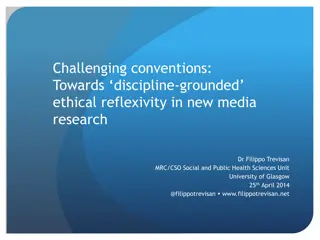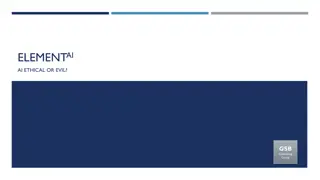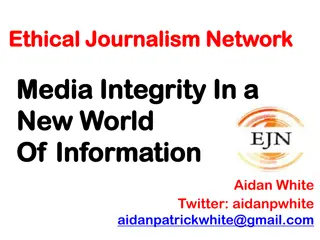Ethical Challenges in Digital Education: Navigating the Complexities
Explore the intersections of digital didactics, ethical dilemmas, and ICT ethics in education. From the evolution of teaching methodologies to the impact of digital sources, discover the importance of addressing ethical reflections and legal regulations in a rapidly evolving technologized schooling environment.
Download Presentation

Please find below an Image/Link to download the presentation.
The content on the website is provided AS IS for your information and personal use only. It may not be sold, licensed, or shared on other websites without obtaining consent from the author. Download presentation by click this link. If you encounter any issues during the download, it is possible that the publisher has removed the file from their server.
E N D
Presentation Transcript
DIGITAL DIDACTICS AND ETHICAL DILEMMAS Mgr. Annam ria Brijakov , INFINIT 2022
FROM A "DIDACTIC TRIANGLE" TO A "DIDACTIC TETRAHEDRON" (DONEVSKA-TODOROVA, TRGALOVA 2017)
DIGITAL SOURCES IN EDUCATION (MAMARAJABOV 2022) digital technologies as a universal tools of learning (office programs, graphic editors, Internet browsers, communication tools, augmented reality, etc.); pedagogical technologies that include the use of digital technologies; specialized digital educational technologies (edtech) such as virtual mentors, portable devices, educational gaming tasks in augmented reality, gaming environments, smart learning tools, etc.; production technologies (digital, material and social), which form the necessary professional competences, knowledge and skills of pupils.
WHAT DOES ICT ETHICS MEAN? the study of overt and hidden, present and future moral issues related to the design, development and use of ICT designing morally acceptable standards of development and use of ICT, as well as in designing ethical principles for professions working in the field of ICT Most relevant in emergent ICT, whose expansion is exponential and whose impact is difficult to predict (Greif a Podrou ek 2019).
PROBLEMS WITH USING DIGITAL SOURCES IN EDUCATION Teachers are often not adequately trained in the uses and potential ethical implications of teaching in an increasingly digitalized schooling environment. That dilemmas relating to technologization are occurring in schools, from the micro level of individual digital technology use through to the macro level of system-wide policy and practice. Ethical reflextion and legal regulation lag behind the latest technological possibilities ACM Code of Ethics and Professional Conduct, has not been updated since 1992 until recently (June 2018) GDPR implementation in EU (2018)
PROBLEMS WITH USING DIGITAL SOURCES IN EDUCATION Equity - there is a well-established link between educational achievement and socioeconomic status. the push for educational technologies in schools can exacerbate inequalities. policies such as Bring Your Own Device
I. STUDENTS ONLINE ETHICS pirate content or bully, harass, or embarrass others. education needs to catch up with the changing norms of Internet usage and provide students with ethical understanding of the consequences of their online actions (James 2014) 3 types of ethical understanding:
1. CONSEQUENCE-BASED THINKING A self-focused understanding focuses on the implication for one s self of a particular action. It is consequence- based thinking, e.g., If I pirate this music how likely am I to get caught? What would happen to me if I got caught? or Will I look bad if I share this amusing photo of my classmate?
2. MORAL THINKING Thinking based on the golden rule, treat others the way you d like them to treat you. It is what James terms a neighborly morality when concern is exercised for known others, e.g., Sharing this photo of my classmate might embarrass or upset them, so it s not the right thing to do.
3. ETHICAL THINKING Thinking about unknown others. It is macro morality and consists of ethical thinking on the effects of one s actions on multiple and distant stakeholders and the larger community. This type of thinking involves complex perspective taking and understanding of roles and responsibilities in online interactions.
II. DIGITAL DILEMMAS FOR TEACHERS Many teachers use the Internet to create their own professional networks and undertake professional development in an informal manner (e.g., through the use of Facebook groups) BUT social media can be public the social distance between teachers and students has been shortened by the availability of connections on social networking sites. Former teacher sues after shewas fired over Facebook post Teacher Loses Job AfterCommentingAbout Students, Parentson Facebook Teacher fired for friendingher students To what degree do teachers have the right to follow social norms and participate in digital culture when this is at odds with the moral requirementsof their profession?
APPS IN THE CLASSROOM - ISSUES OF DATA OWNERSHIP apps can collect data, not only about student achievement but student behavior, photographs, and work samples and continuously monitor individuals increased commercialization of public education that is occurring via teacher take-up of technologies that are free for them and their students, which generate profit via the data that is collected. Possible solution - transparency of monitoring education and deleting the data immediately once processed
ARTIFICIAL INTELLIGENCE AND MACHINE LEARNING helping identify and attract students to institutions, forecast enrollment and predict outcomes, and identify at-risk students. helping improve teacher efficiency and impact with personalized content and AI-enabled teaching assistants and tutors. personalizing learning content for a learner or educator s specific needs BUT These new advancements are generating more data than ever, and education technology (EdTech) companies are using this data to create their own ML models to take advantage of the many out-of-the- box AI services.
POTENTIAL ETHICAL AND SOCIETAL RISKS OF AI APPLICATIONS IN EDUCATION (AKGUN AND GREENHOW 2022 ) In essence, algorithms reflect the values of their builders who hold positions of power People create a set of data that represent society s historical and systemic biases, which ultimately transform into algorithmic bias.
COMPAS ALGORITHM estimating the rate recidivism among prisoners in some US states. The result is a score which can ultimately affect the amount of the prisoner's sentence or his parole. These scores have been shown to assign disproportionately high negative scores to African Americans.
AT LEAST WE ARENT AS FAR GONE AS CHINA But if you want to erode civil liberties and traditions of privacy, it s best to start with people who don t have the political power to fight back. Children are ideal not only can t they fight back, but they will grow up thinking it s perfectly normal to live under constant surveillance. For their own safety, of course.
EDTECHTOOLS https://database.edtechhub.org/tools/ EdTechTools is a database of educational and skills development tools curated by EdTech Hub in partnership with Generation Unlimited (GenU), UNESCO, and UNESCO-UNEVOC. EdTechTools was designed to help decision-makers at all levels in the global education and training community find resources that facilitate and support remote learning.
Teacher Didactic Engineer
Teacher Didactic Engineer Ethicist
THANK YOU FOR YOUR ATTENTION Mgr. Annam ria Brijakov annamaria.brijakova@uniba.sk
